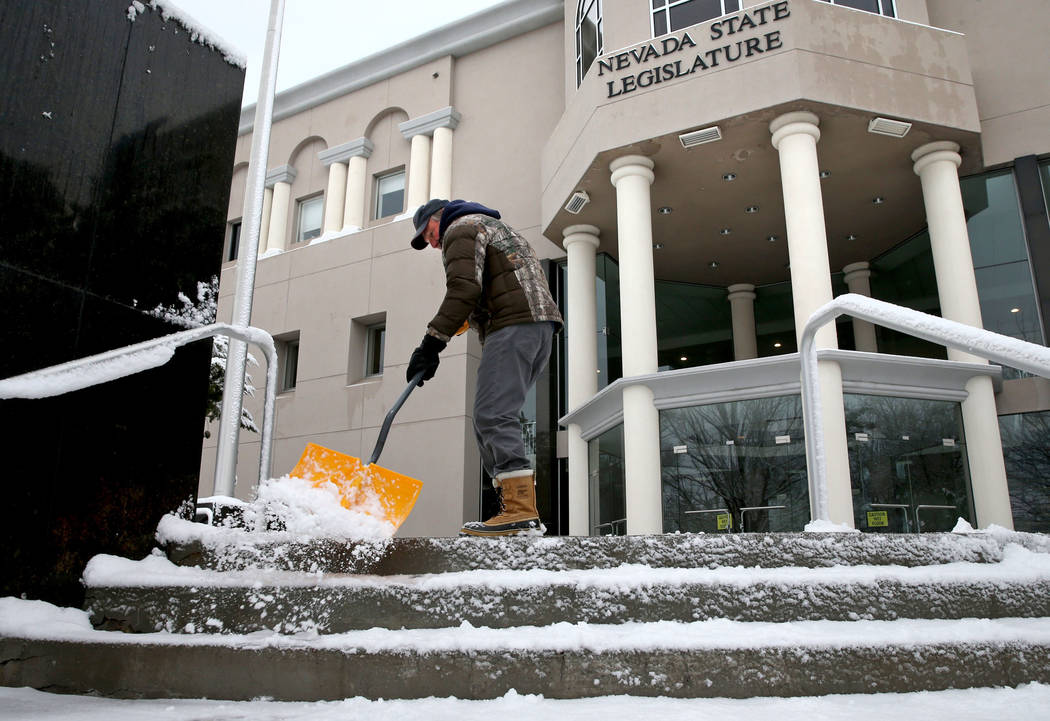Clark County will closely monitor Nevada legislative session

Nevada legislators will mull this year expanding the Clark County governing board from seven to nine members. County commissioners on Tuesday did not reveal feelings on the bill, but it will be one of several they plan to follow in 2019.
The commission will track state lawmaker activities during the legislative session, which kicked off Monday, and they are particularly keen on the progress of four bills that originated in Clark County.
Assembly Bill 79 would provide the county with speedier recourse to address abandoned buildings, expedite the delinquent tax foreclosure process for properties deemed vacant and reduce from three years to two the period in which a delinquent property is eligible to sell at public auction.
AB 2 raises the threshold for projects that require professional engineering or land surveying from $35,000 to $100,000.
Senate Bill 36 would change how fair market value is calculated for property that is leased or placed up for sale, averaging two required appraisals in lieu of using the higher of the two.
And SB 77 expands the purchasing authorization for county hospitals to include services through purchasing groups in which they participate.
Mason Vanhouweling, the CEO of University Medical Center, told commissioners that the bill would enable UMC to participate in contracts for blood, linen and other services afforded to 8,000 other hospitals in the country.
“We anticipate that this could net about half a million dollars savings to the hospital annually,” Vanhouweling said.
Each of the four county bills have been assigned to a committee, with a hearing on SB 36 scheduled Wednesday in front of the Senate Committee on Government Affairs.
County officials also plan to closely monitor bills beyond their own, including SB 127, the legislation that proposes to expand the number of commissioners by two. Introduced by Democratic state Sen. David Parks, the bill is targeted toward counties with 700,000 or more people, which would presently only impact Clark County.
If successful, the bill mandates that those two extra positions not be filled until the November 2022 general election.
County Manager Yolanda King also called commissioners’ attention to bills that enact bail reform, push for additional marijuana dispensaries in incorporated cities and enable jurisdictions to create a nonprofit in emergency situations.
King said she planned to testify in a hearing on the latter proposal, noting how the county was unable to create a 501(c)(3) amid an outpouring of financial support in the wake of the Oct. 1, 2017, mass shooting.
She added that the county also will watch the city of Las Vegas’ bill to impose an additional tax on real property transfers in certain counties to boost funding for services and affordable housing for the homeless or indigent.
And AB 43, which would add eight judges to the Eighth Judicial District Court, is likely a bill that the county will play defense on, according to King.
“Obviously, that would have a significant impact on us here in Clark County,” she said, “with regard to providing resources in our various departments.”
Deferring to state on marijuana
After a monthslong hiatus, the commission revisited talks about cannabis consumption lounges on Tuesday — albeit briefly.
The commission decided to defer to the state, where Gov. Steve Sisolak recently created a marijuana advisory panel, in lieu of vetting potential for social use venues themselves through the county’s Green Ribbon Panel.
The planned discussion had been raised by Commissioner Tick Segerblom, but he suggested that the state task force could act as the authority on consumption lounges, saying Sisolak’s office asked that county officials follow the state’s lead.
Gunshot detection program may expand
The commission appeared to welcome a three-year expansion of ShotSpotter, a gunshot detection pilot program in conjunction with police officials that has shown early signs of success.
Commission Chairwoman Marilyn Kirkpatrick said the county is seeking a $11.5 million grant through the University of Nevada Cooperative Extension that could mean installing the program in every district. Currently, it’s in six square miles on the north and south sides of the county.
Metropolitan Police Department Lt. Dori Koren, the ShotSpotter program manager, said it would cost $8 million to $10 million over three years to introduce it in each hotspot for gun violence. Koren’s estimate includes costs for technology, fiber infrastructure for cameras and budgeted police personnel.
He said he believed expanding the program could help to identify between 800 and 1,400 shootings annually that otherwise would go unreported. During a one-year pilot program, 65 percent of 487 potential shootings identified by ShotSpotter detection were not reported to police.
The program is expected to be re-evaluated at year’s end.
Contact Shea Johnson at sjohnson@reviewjournal.com or 702-383-0272. Follow @Shea_LVRJ on Twitter.